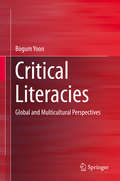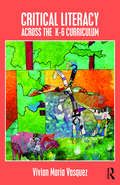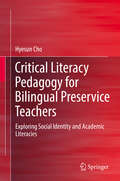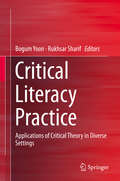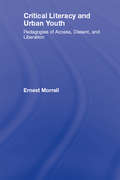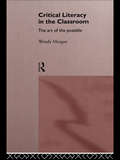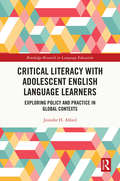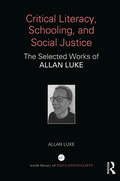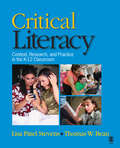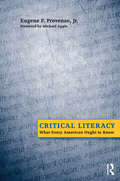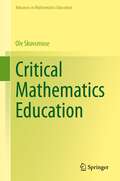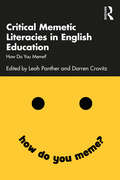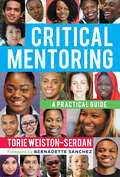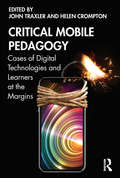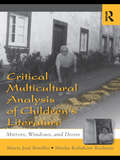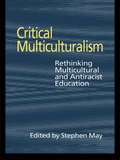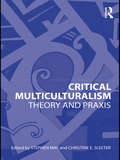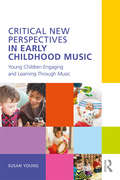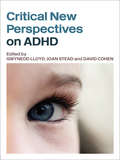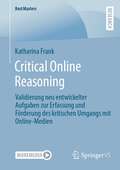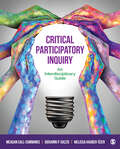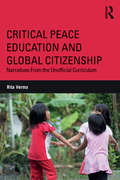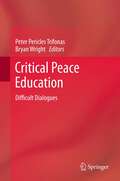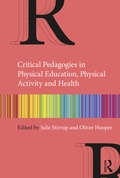- Table View
- List View
Critical Literacies: Global and Multicultural Perspectives
by Bogum YoonThis book offers comprehensive coverage of critical literacies by pursuing a balanced approach to theory, research, and practice. By clarifying the gaps among the frameworks of critical literacies, the author discusses new ways of approaching them from global and multicultural perspectives and provides an instructional model of critical global literacies that draws on her own experience and an extensive literature review. This insightful book also documents teachers' case studies, focusing on their voices and instructional approaches in diverse classrooms. The author critically analyses the case studies and offers important suggestions for future research and practice.
Critical Literacy Across the K-6 Curriculum
by Vivian Maria VasquezThrough stories from kindergarten to sixth grade classrooms where students and teachers have attempted to put a critical edge on their teaching, this book shows critical literacy in action across the curriculum. Readers see students and teachers together using critical literacy discourse to frame conversations in ways that engage students in examining the meaning of the texts they read and acting on local and global social issues that emerge. Drawing on multiple perspectives such as cross-curricular explorations, multimedia, and child-centered inquiry pedagogies, the text features a theoretical toolkit; demonstrations from across the content areas including art, music, and media literacy; integration of technology; and attention to how critical literacy can inform decisions about standards and assessment. Annotated booklists, examples of students’ work, Reflection Questions, Try This (practical classroom strategies), and Resource Boxes can be used to encourage and support engaging in critical literacy work in different areas of the curriculum.
Critical Literacy Pedagogy for Bilingual Preservice Teachers: Exploring Social Identity and Academic Literacies
by Hyesun ChoThis book presents a participatory action research study exploring the social identity and academic literacies of bilingual preservice teachers. It describes the transformative experiences of undergraduate students during their participation in a program specially designed to develop bilingual teachers in Hawaii, USA. Further, it discusses how the curriculum and instruction in the classroom provide a ‘third space’ for facilitating peer interaction and critical reflection on such issues as academic literacy, heritage language education, and teacher identity. In doing so, it connects ideas of social identity and academic literacies of bilingual preservice teachers to the “real work” of mentoring and teaching PreK-12 students themselves.
Critical Literacy Practice: Applications of Critical Theory in Diverse Settings
by Bogum Yoon Rukhsar SharifThis edited book shows how critical literacy can be applied in and outside the classroom setting. It shows educators how critical theory is applied in practice using studies in diverse K-16 settings, kindergarten through university contexts. By providing specific examples of critical literacy practice in the classroom and beyond, the book aims to help teachers, researchers and teacher educators make clear connections between theory and practice in critical literacy.
Critical Literacy and Urban Youth: Pedagogies of Access, Dissent, and Liberation (Language, Culture, and Teaching Series)
by Ernest MorrellCritical Literacy and Urban Youth offers an interrogation of critical theory developed from the author’s work with young people in classrooms, neighborhoods, and institutions of power. Through cases, an articulated process, and a theory of literacy education and social change, Morrell extends the conversation among literacy educators about what constitutes critical literacy while also examining implications for practice in secondary and postsecondary American educational contexts. This book is distinguished by its weaving together of theory and practice. Morrell begins by arguing for a broader definition of the "critical" in critical literacy – one that encapsulates the entire Western philosophical tradition as well as several important "Othered" traditions ranging from postcolonialism to the African-American tradition. Next, he looks at four cases of critical literacy pedagogy with urban youth: teaching popular culture in a high school English classroom; conducting community-based critical research; engaging in cyber-activism; and doing critical media literacy education. Lastly, he returns to theory, first considering two areas of critical literacy pedagogy that are still relatively unexplored: the importance of critical reading and writing in constituting and reconstituting the self, and critical writing that is not just about coming to a critical understanding of the world but that plays an explicit and self-referential role in changing the world. Morrell concludes by outlining a grounded theory of critical literacy pedagogy and considering its implications for literacy research, teacher education, classroom practice, and advocacy work for social change.
Critical Literacy in the Classroom: The Art of the Possible
by Wendy MorganCritical literacy investigates how forms of knowledge, and the power they bring, are created in language and taken up by those who use texts. It asks how language might be put to different, more equitable uses, and how texts might be recreated in a way that would tell a different story.This book is a carefully documented and critically analysed example of the growing emphasis on critical literacy in syllabuses, government reports and the like. It:* bridges the gap between academics' theorizing and teachers' work* describes how secondary teachers have planned and implemented critical literacy curricula on a range of topics, from Shakespeare to the workplace* listens to teachers reflecting on their teaching and analyses classroom talk* extrapolates from present practice to a future critical literacy in a digitised, hypermedia world.Teachers and students of education, critical literacy advocates and theorists of literacy and schooling can learn much more from this book, which shows how critical literacy teachers, and their students are contributing to the ongoing reinvention of English education as critical literacy.
Critical Literacy with Adolescent English Language Learners: Exploring Policy and Practice in Global Contexts (Routledge Research in Language Education)
by Jennifer AlfordThis book examines critical literacy within language and literacy learning, with a particular focus on English as an Additional Language learners in schools who traditionally are not given the same exposure to critical literacy as native-English speakers. An important and innovative addition to extant literature, this book explains how English language teachers understand critical literacy and enact it in classrooms with adolescent English language learners from highly diverse language backgrounds. This book brings together the study of two intersecting phenomena: how critical literacy is constructed in English language education policy for adolescent English language learners internationally and how critical literacy is understood and enacted by teachers amid the so-called ‘literacy crisis’ in neoliberal eduscapes. The work traces the ways critical literacy has been represented in English language education policy for adolescents in five contexts: Australia, England, Sweden, Canada and the United States. Drawing on case study research, it provides a comparative analysis of how policy in these countries constructs critical literacy, and how this then positions critical engagement as a focus for teachers of English language learners. Empirically based and accessibly written, this timely book will be of interest to a wide range of academics in the fields of adolescent literacy education, English language learning and teaching, education policy analysis, and critical discourse studies. It will also appeal to teachers, post-graduate students and language education policy makers.
Critical Literacy, Schooling, and Social Justice: The Selected Works of Allan Luke
by Allan LukeIn the World Library of Educationalists series, international scholars themselves compile career-long collections of what they judge to be their finest pieces – extracts from books, key articles, salient research findings, major theoretical and/or practical contributions – so the world can read them in a single manageable volume. Readers will be able to follow the themes and strands of their work and see their contribution to the development of a field, as well as the development of the field itself. Allan Luke’s work on critical literacy, schooling, and equity has influenced the fields of literacy education, teacher education, educational sociology, and policy for over three decades. This volume brings together Allan Luke’s key writings on literacy and schooling. Chapters cover a range of topics and theories, including the development and application of a social and cultural analysis of literacy education and schooling; a primer on literacy as a social construction; classroom-based case studies of literacy teaching and learning; major theoretical and philosophic essays; practical programmatic work on school reform and enabling curriculum policies; and classroom approaches to teaching critical literacy and multiliteracies.
Critical Literacy: Context, Research, and Practice in the K-12 Classroom
by Thomas W. Bean Lisa Patel StevensAuthors Lisa Patel Stevens and Thomas W. Bean explore the historical and political foundations of critical literacy and present a comprehensive examination of its uses for K-12 classroom practice. <p><p> Key Features: <p> · Focuses on the nexus of critical literacy theory and practice through real classroom examples, vignettes, and conversations among teachers and teacher educators <p> · Illustrates how critical literacy practices are enacted in the classroom at the elementary, middle, and high school levels. <p> · Offers step-by-step teaching strategies for implementing critical literacy in K-12 classrooms at different paces, depending on existing curriculum <p> Intended Audience: This is an excellent supplemental text for a variety of advanced undergraduate and graduate courses in education departments on how to teach reading and writing. This text will also appeal to instructors and students exploring issues of representation, linguistics, and critical deconstruction.
Critical Literacy: What Every American Needs to Know (Series In Critical Narrative)
by Michael W. Apple Eugene F. ProvenzoIn Critical Literacy Eugene F. Provenzo Jr. challenges E. D. Hirsch's assumptions about culture and education. Calling for a broader and more democratic vision than Hirsch, Provenzo critiques Hirsch's legacy up through the current conservative educational agenda for education which, he argues, denies, not only the United States' diversity, but its democratic traditions of democratic participation. His book shows why critical faculties and skills of students are essential not only to the success of individual students but to their participation in a healthy democracy. Provenzo offers a list of 5,000 things every educated American ought to know-- none of them the same items as those included on Hirsch's list in Cultural Literacy. Critical Literacy is essential reading for those concerned with our schools and the future of our children.
Critical Mathematics Education (Advances in Mathematics Education)
by Ole SkovsmoseThe book Critical Mathematics Education provides Ole Skovsmose’s recent contribution to the further development of critical mathematics education. It gives examples of learning environments, which invite students to engage in investigative processes. It discusses how mathematics can be used for identifying cases of social injustice, and it shows how mathematics itself can become investigated critically. Critical Mathematics Education addresses issues with respect to racism, oppression, erosion of democracy, sustainability, formatting power of mathematics, and banality of mathematical expertise. It explores relationships between mathematics, ethics, crises, and critique.
Critical Memetic Literacies in English Education: How Do You Meme?
by Darren Crovitz Leah PantherThis edited collection introduces English and literacy educators to the theoretical, research-based, and practical dimensions of using digital memetic texts—“memes”—in the classroom. Digital memetic texts come with new affordances, particularly as avenues for student creativity, voice, and advocacy. But these texts can also be put to manipulative, propagandistic, and nefarious purposes, posing critical challenges to an informed, democratic citizenry. Grounded in multimodality and critical literacy, this book investigates the fascinating digital dimension of texts, audiences, and meaning, and considers how English educators might take up these conversations in practical ways with students. With authentic examples from teachers and students, this volume provides a road map to researchers and educators—both preservice and in-service—interested in critical and productive uses of these modern phenomena.
Critical Mentoring: A Practical Guide
by Torie Weiston-SerdanThis book introduces the concept of critical mentoring, presenting its theoretical and empirical foundations, and providing telling examples of what it looks like in practice, and what it can achieve. At this juncture when the demographics of our schools and colleges are rapidly changing, critical mentoring provides mentors with a new and essential transformational practice that challenges deficit-based notions of protégés, questions their forced adaptation to dominant ideology, counters the marginalization and minoritization of young people of color, and endows them with voice, power and choice to achieve in society while validating their culture and values.Critical mentoring places youth at the center of the process, challenging norms of adult and institutional authority and notions of saviorism to create collaborative partnerships with youth and communities that recognize there are multiple sources of expertise and knowledge. Torie Weiston-Serdan outlines the underlying foundations of critical race theory, cultural competence and intersectionality, describes how collaborative mentoring works in practice in terms of dispositions and structures, and addresses the implications of rethinking about the purposes and delivery of mentoring services, both for mentors themselves and the organizations for which they work. Each chapter ends with a set of salient questions to ask and key actions to take. These are meant to move the reader from thought to action and provide a basis for discussion.This book offers strategies that are immediately applicable and will create a process that is participatory, emancipatory and transformative.
Critical Mobile Pedagogy: Cases of Digital Technologies and Learners at the Margins
by John Traxler and Helen CromptonCritical Mobile Pedagogy is an exploration of mobile technologies for designing and delivering equitable and empowering education around the globe. Synthesizing a diverse range of projects and conceptual frameworks, this case-based collection addresses the ambitions, assumptions, and impacts of interventions in under-researched, often disadvantaged communities. The editors and authors provide a nuanced and culturally responsive approach to showcasing: indigenous, nomadic, refugee, rural, and other marginalized communities emerging pedagogies such as curation, open resources, massive open online courses (MOOCs), and self-directed learning contextual factors, including pedagogy, ethics, scaling, research methodology and culture, and consequences of innocuous or harmful implementation and deployment the nature of participation by global capital, multinationals, education systems, international agencies, national governments, and telecoms companies. Scholars, academics, policymakers, and program managers are increasingly using mobile technologies to support disadvantaged or disempowered communities in learning more effectively and appropriately. This book’s diverse research precedents will help these and other stakeholders meet the challenges and opportunities of our complex, increasingly connected world and work with greater cultural and ethical sensitivity at the intersection of education, research, and technology.
Critical Multicultural Analysis of Children's Literature: Mirrors, Windows, and Doors (Language, Culture, and Teaching)
by Maria José Botelho Masha Kabakow Rudman<p>Critical multicultural analysis provides a philosophical shift for teaching literature, constructing curriculum, and taking up issues of diversity and social justice. It problematizes children’s literature, offers a way of reading power, explores the complex web of sociopolitical relations, and deconstructs taken-for-granted assumptions about language, meaning, reading, and literature: it is literary study as sociopolitical change. <p>Bringing a critical lens to the study of multiculturalism in children’s literature, this book prepares teachers, teacher educators, and researchers of children’s literature to analyze the ideological dimensions of reading and studying literature. Each chapter includes recommendations for classroom application, classroom research, and further reading. Helpful end-of-book appendixes include a list of children’s book awards, lists of publishers, diagrams of the power continuum and the theoretical framework of critical multicultural analysis, and lists of selected children’s literature journals and online resources.</p>
Critical Multiculturalism: Rethinking Multicultural and Antiracist Education (Social Research And Educational Studies)
by Stephen MayThis book aims to bring together two movements - multiculturalism and anti- racism - which, though having aims in common, have been at arms length in the past. Differences of emphasis have meant that classroom practice has been the natural realm of multiculturalism, while anti-racism has been dissatisfied with an approach that accentuates life-style at the expense of challenging or changing the racism that minority students experience. In these debates, there has been a concentration on culturally specific topics and this book goes beyond national boundaries to find how international concerns and contexts might provide answers to problems faced in single countries. Leading figures in the USA, Canada, South Africa, the UK and Australasia write on the issues.
Critical Multiculturalism: Theory and Praxis
by Stephen MayCritical multiculturalism has emerged over the last decade as a direct challenge to liberal or benevolent forms of multicultural education. By integrating and advancing various critical theoretical threads such as anti-racist education, critical race theory, and critical pedagogy, critical multiculturalism has offered a fuller analysis of oppression and institutionalization of unequal power relations in education. But what do these powerful theories really mean for classroom practice and specific disciplines? Edited by two leading authorities on multicultural education, Critical Multiculturalism: Theory and Praxis brings together international scholars of critical multiculturalism to directly and illustratively address what a transformed critical multicultural approach to education might mean for teacher education and classroom practice. Providing both contextual background and curriculum specific subject coverage ranging from language arts and mathematics to science and technology, each chapter shows how critical multiculturalism relates to praxis. As a watershed in the further development of critical multicultural approaches to education, this timely collection will be required reading for all scholars, educators and practitioners of multicultural education.
Critical New Perspectives in Early Childhood Music: Young Children Engaging and Learning Through Music
by Susan YoungExploring and expanding upon current understandings of early childhood music education, this book provides a much-needed response to the rapid social, cultural and technological developments affecting children’s experience of music today. Critical New Perspectives in Early Childhood Music returns to the core question of how children engage, participate and learn through music, and how we are to best harness musical resources to their benefit. Chapters move beyond conservative or traditional models of practice and draw upon new and emerging insights from the fields of childhood studies, neuroscience, psychology and sociology. In-depth analysis of research and real examples from practice illustrate the strengths and possible shortcomings of each approach and acknowledge the diverse impacts of digitisation, increased child autonomy, intensive parenting practices, and cultural and economic diversity on the child’s experience of music. An invaluable theoretical overview of current thinking in relation to contemporary musical childhoods, this book will support and challenge students and early childhood music educators as they rethink practice for the present day.
Critical New Perspectives on ADHD
by Gwynedd LloydExperts from all over the world take a critical, highly international and often controversial perspective on the ADHD phenomenon – a condition that has reached global proportions, significantly affecting the lives of children, parents and teachers worldwide. This book raises a number of concerns often not covered by the material currently available to parents and practitioners. Critical New Perspectives on ADHD unpicks the myths surrounding the development of this phenomenon and leaves no stone unturned in its search for answers. An in-depth exploration into the reasons for the emergence and maintenance of ADHD lead to suggested explanations of the dominance of US psychiatric models and the need for new markets for major pharmaceutical companies, as well as the functions that ADHD diagnoses fulfil in families, classrooms and communities. In a world where moves to educational inclusion are paradoxically paralleled by the ever-increasing use of medication to control children’s behaviour, this book scrutinises current accepted practice and offers alternative perspectives and strategies for teachers and other education professionals. This in an invaluable resource for anyone with a serious interest in ADHD and other behavioural difficulties.
Critical Online Reasoning: Validierung neu entwickelter Aufgaben zur Erfassung und Förderung des kritischen Umgangs mit Online-Medien (BestMasters)
by Katharina FrankDas Lernen mit frei zugänglichen Online-Ressourcen als wichtige Informationsquelle zum Erwerb neuen Wissens birgt einige Herausforderungen, da Inhalte im Internet frei verbreitet werden können und unüberschaubare Mengen an unstrukturierten, unzuverlässigen, oder voreingenommenen Informationen leicht zugänglich sind. Studierende müssen in der Lage sein, Online-Informationen und -Quellen zu suchen, zu selektieren, auszuwählen, zu überprüfen und anhand relevanter Kriterien kritisch zu bewerten. In Deutschland wurde dahingehend ein neuer theoretisch-konzeptueller Ansatz für die Operationalisierung dieser Fähigkeiten durch das Konstrukt Critical Online Reasoning (COR) sowie Messung dieser Fähigkeiten mittels eines neuen Assessments (CORA) entwickelt. Auf Grundlage theoretischer Überlegungen zum COR-Konstrukt sowie zur argumentationsbasierten Validierung nach den Standards for Educational and Psychological Testing (AERA et al.) ist das Ziel dieser Arbeit eine Analyse von zentralen Validierungsaspekten.
Critical Participatory Inquiry: An Interdisciplinary Guide
by Meagan Call-Cummings Giovanni P. Dazzo Melissa Hauber-OzerCritical Participatory Inquiry: An Interdisciplinary Guide brings to life key principles of this collaborative research method for students, practitioners, and research collectives. The authors encourage readers to uncover new possibilities in research guided by the emancipatory roots of CPI to deconstruct inequitable conditions and practices. Weaving together theoretical perspectives, a variety of tools for data collection and analysis, and numerous practical examples, the authors offer a complete picture of the research process from start to finish. This thoughtful and thorough book prepares readers to co-create knowledge effectively and ethically. By addressing the underlying principles common to a variety of action and participatory research methods, readers learn to design and carry out research with, not on, communities. With examples from public health, social work, psychology, education, criminal justice, conflict resolution, and more, the text is suited to a wide variety of graduate-level courses and better reflects the interdisciplinary nature of participatory research with collectives of all sizes and compositions.
Critical Participatory Inquiry: An Interdisciplinary Guide
by Meagan Call-Cummings Giovanni P. Dazzo Melissa Hauber-OzerCritical Participatory Inquiry: An Interdisciplinary Guide brings to life key principles of this collaborative research method for students, practitioners, and research collectives. The authors encourage readers to uncover new possibilities in research guided by the emancipatory roots of CPI to deconstruct inequitable conditions and practices. Weaving together theoretical perspectives, a variety of tools for data collection and analysis, and numerous practical examples, the authors offer a complete picture of the research process from start to finish. This thoughtful and thorough book prepares readers to co-create knowledge effectively and ethically. By addressing the underlying principles common to a variety of action and participatory research methods, readers learn to design and carry out research with, not on, communities. With examples from public health, social work, psychology, education, criminal justice, conflict resolution, and more, the text is suited to a wide variety of graduate-level courses and better reflects the interdisciplinary nature of participatory research with collectives of all sizes and compositions.
Critical Peace Education and Global Citizenship: Narratives From the Unofficial Curriculum (Critical Social Thought)
by Rita VermaCritical Peace Education and Global Citizenship offers narrative accounts representing multiple ways teacher and learner activists have come to realize possibilities for peace and reconciliation through unofficial curricula. With these narratives, the book demonstrates the connections between critical peace education and such crucial issues as human trafficking, gang violence, contested narratives of nationhood and belonging, gender identities, and the significance of mentoring. Through rich examples of pedagogic work, this volume enhances and illustrates critically oriented understandings and interpretations of peace in real classrooms with diverse populations of students. Written primarily for scholars and graduate students working in the fields of educational theory, critical pedagogy, and educational policy, the chapters in this book tell a compelling story about teachers, learners and scholar activists who continue to struggle for the creation of transformative and meaningful sites for peace praxis.
Critical Peace Education: Difficult Dialogues (Routledge Research In Education)
by Bryan Wright Peter Pericles TrifonasForward-thinking pedagogues as well as peace researchers have, in recent decades, cast a critical eye over teaching content and methodology with the aim of promulgating notions of peace and sustainability in education. This volume gives voice to the reflections of educational theorists and practitioners who have taken on the task of articulating a 'curriculum of difference' that gives positive voice to these key concepts in the pedagogical arena. Here, contributors from around the world engage with paradigm-shifting discourses that reexamine questions of ontology and human subjectivity--discourses that advocate interdisciplinarity as well as the reformulation of epistemological boundaries. Deconstructing the origins and limits of human knowledge and learning, the book affords educators the opportunity to identify and express common elements of the subjects taught and studied in educational institutions, elements that facilitate students' apprehension of peace and sustainability. With penetrating analysis of contemporary issues in the field, this volume introduces a range of fresh theoretical approaches that extend the boundaries of peace education, which is broadly defined as promoting the responsible, equitable and sustainable co-existence of differing human communities. In doing so, the chapters show how we can improve our lives as well as our chances of survival as a species by acknowledging the importance of shared human aspirations that cut across borders, of genuinely listening to alternative voices and opinions, of challenging the ubiquitous, socially constructed historical narratives that define human relations only in terms of power. Charged with vitality and originality, this new publication is a critical examination of issues central to the development and utility of global education.
Critical Pedagogies in Physical Education, Physical Activity and Health
by Julie Stirrup Oliver HooperCritical Pedagogies in Physical Education, Physical Activity and Health explores critical pedagogy – and critical work around the body, health and physical activity – within physical education. By examining the complex relationships between policies and practice, and how these are experienced by young people, it elucidates the need for critical pedagogy in contemporary times. With contributions from leading international experts in health and physical education, and underpinned by a critical, socio-cultural approach, the book examines how health and physical education are situated across various international contexts and the influence of policy and curriculum. It explores how health is constructed by students and teachers within these contexts as well as how wider spaces and places beyond formal schooling influence learning around the body, health and physical activity. Finally, it considers what progressive pedagogies might ‘look like’ within health and physical education. Chapters utilise empirical work within the field to explore various topics of relevance to critical pedagogy, drawing on theoretical insights while providing practical applications and concluding with reflection points to encourage readers to consider the relevance for their own contexts. Designed to support pedagogical study in a range of contexts, this book will be of particular interest to undergraduate and postgraduate students, teachers and researchers with an interest in physical education, physical activity and health and the role they play in young people’s lives.
